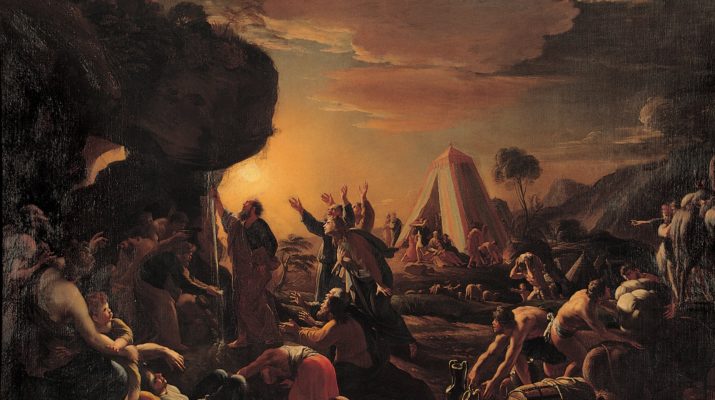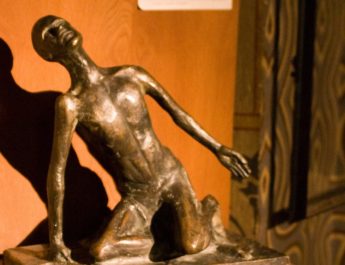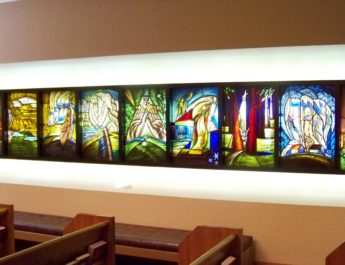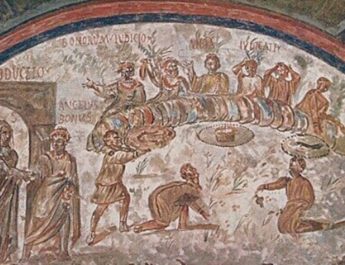Exodus 17:1-7
Lent A16
BibleHub
1 From the wildernessA of SinB the whole congregationC of the IsraelitesD journeyedE by stages,F as the Lord commanded.G
Notes on verse 1a
A “wilderness” = midbar. From dabar (to speak, command, declare). This is mouth or speech. It can also be desert or wilderness. Additionally, it can be used for a pasture to which one drives cattle.
B “Sin” = sin. 6x in OT. This is Sin – a frontier city on the outskirts of Egypt as well as a desert region. It has nothing to do with the English word “sin.”
C “congregation” = edah. From yaad (to appoint, assemble or gather selves, agree) OR from ed (witness, testimony, recorder); from ud (to admonish, repeat, duplicate, testify, restore, record, relieve). This is a congregation, assembly, or company. It could be a family, crowd, or fixture.
D “Israelites” = ben + yisrael. Literally “children of Israel.” Yisrael is from sarah (to persist, exert oneself, contend, persevere, wrestle, prevail) + el (God or god). This is God strives or one who strives with God; new name for Jacob and for his offspring. This refers to the people and to the land.
E “journeyed” = nasa. This is properly pulling up as when one pulls up tent pegs or stakes. This would imply striking tents in order to start a journey. So this could be bring, pullout, set out, journey, or cause to go away.
F “stages” = massa. Related to “journeyed” in v1. 12x in OT. From nasa (see note E above). This is a pulling up or breaking camp. So, it means to set out on a journey, to travel in stages, an order of march for a journey. It does not necessarily refer to a day’s journey. It can imply a station or a place from which one disembarks.
G “as the Lord commanded” = al + peh + YHVH. Literally “according to the mouth of the Lord.” YHVH is from havah (to be, become) or hayah (to come to pass, become, be). This is the name of the God of Israel, the self-existent and eternal one, the tetragrammaton. This pronunciation has been lost to time so “Lord” is generally used in its place.
They campedH at Rephidim,I but there was no water for the peopleJ to drink.
2 The people quarreledK with Moses,L and said, “Give us water to drink.”
Notes on verses 1v-2a
H “camped” = chanah. This is decline, bending down, or living in tents. It can be camping to create a home or camping as a part of battle.
I “Rephidim” = Rephidim. 5x in OT. From raphad (to spread a bed, which implies being refreshed or comforted). This is Rephidim, a desert location whose name may mean supports.
J “people” = am. From amam (to darken, hide, associate; creating shadows by huddling together). This is people or nation. It can be used specifically for a tribe, collectively of troops or armies, or figuratively to refer to a flock of animals.
K “quarreled” = rib. This is properly to toss or grapple. It is used figuratively to mean wrangling and so for arguments, complaints, or disputes. It is used in a legal setting for pleading or defending a case.
L “Moses” = mosheh. From mashah (to pull out in a literal or figurative sense, to draw out) OR from Egyptian mes or mesu (child, son i.e. child of…). This is Moses – the one drawn out from the water, which is to say, rescued. If derived from the Egyptian, his name would share a root with Rameses and Thutmose.
Moses said to them, “Why do you quarrel with me? Why do you testM the Lord?”
3 But the people thirsted there for water; and the people complainedN against Moses and said, “Why did you bring us out of Egypt,O to kill us and our children and livestockP with thirst?”
4 So Moses cried outQ to the Lord, “What shall I do with this people? They are almost ready to stoneR me.”
Notes on verses 2b-4
M “test” = nasah. This is to test, assay, try, tempt, or prove.
N “complained” = luwn. This is to stay somewhere, usually for the night. It can mean abide, dwell, or endure. By implication, it can mean staying somewhere permanently. Taken in a negative sense, this would mean obstinance, particularly verbal. So, it can also mean murmur, grudge, or complaining.
O “Egypt” = mitsrayim. Perhaps from matsor (besieged or fortified place, bulwark, entrenchment; something hemmed in; a siege or distress or fastness); from tsur (to confine, besiege, to cramp). This is Egypt.
P “livestock” = miqneh. From qahah (to get, acquire, purchase, move to jealousy, buyer, keep cattle). This is something that is bought, which implies property or possession. However, it is generally used of livestock – cattle, flock, herds.
Q “cried out” = tsaaq. This is to cry out or call together, to shriek. It can mean, by implication, calling for an assembly.
R “stone” = saqal. Properly, this mean being weighty. However, it is used for stoning someone (to death) or for removing stones.
5 The Lord said to Moses, “Go onS aheadT of the people, and take some of the eldersU of Israel with you; take in your handV the staffW with which you struckX the Nile,Y and go.Z
Notes on verse 5
S “go on” = abar. This is to pass over or cross over. It is used for transitions, whether literal or figurative. It can also mean to escape, alienate, or fail. This is the root verb from which “Hebrew” is drawn.
T “ahead” = paneh. Literally “before the face of.”
U “elders” = zaqen. From the same as zaqan (beard or chin – the bear represents old age). This is old, aged, or elder.
V “hand” = yad. This is hand, ability, power. Hand in a literal sense, but also what one can do or the means by which one does it.
W “staff” = matteh. From natah (to stretch or spread out, extend, bend). This is a staff, rod, branch, or tribe. It could be a rod for discipline or correction. It could be a scepter to indicate authority, a throwing lance, or a walking staff. Figuratively, it could also be something that supports life (like bread).
X “struck” = nakah. This is to hit whether lightly or severely. It can be used in a literal or figurative sense. So, this could be beat, punish, give wounds, kill, or slaughter.
Y “Nile” = yeor. From Egyptian yeor (river). This is the Nile as the main river in Egypt. It is also used for the Tigris for its similar status in Assyria. It can also more generally mean river, steam, channel, or flood.
Z “go” = halak. This is go, come, walk. It is walk literally and figuratively and includes people and animals. It can be used figuratively for one’s moral life – how we walk according to God’s way or against it. It can also refer to the walk of life as in the course one’s life takes, the choices we make, etc.
6AA I will be standing there in front of youBB on the rockCC at Horeb.DD Strike the rock, and water will come out of it, so that the people may drink.”
Moses did so, in the sight of the elders of Israel. 7 He calledEE the place MassahFF and Meribah,GG because the Israelites quarreled and tested the Lord, saying, “Is the Lord among us or not?”
Notes on verses 6-7
AA {untranslated} = hen. This is a remark of surprise or excitement: lo! Behold! It can also mean if or though.
BB “in front of you” = paneh. Literally “before your face.” Same as v5.
CC “rock” = tsur. Perhaps related to “Egypt” in v3. Perhaps from tsur (see note O above). This is rock, stone, boulder, sharp, or cliff. Figuratively, it could refer to a refuge, God, or the edge of a cliff as a dangerous place.
DD “Horeb” = choreb. 17x in OT. From chareb (to devastate, desolate, or be waste). Horeb means waste or desolate.
EE “called” = qara + shem. Literally “called the name of.”
FF “Massah” = massah. Related to “test” in v2. 4x in OT. From nasah (see note M above). This is Massah, testing.
GG “Meribah” = meribah. Related to “quarreled” in v2. 6x in OT. From the same as meribah (strife, contention, quarrel); from rib (see note K above). This is Meribah, meaning place of strife.
Image Credit: “Moses Draws Water from the Rock” by Francois Perrier, 1642.




